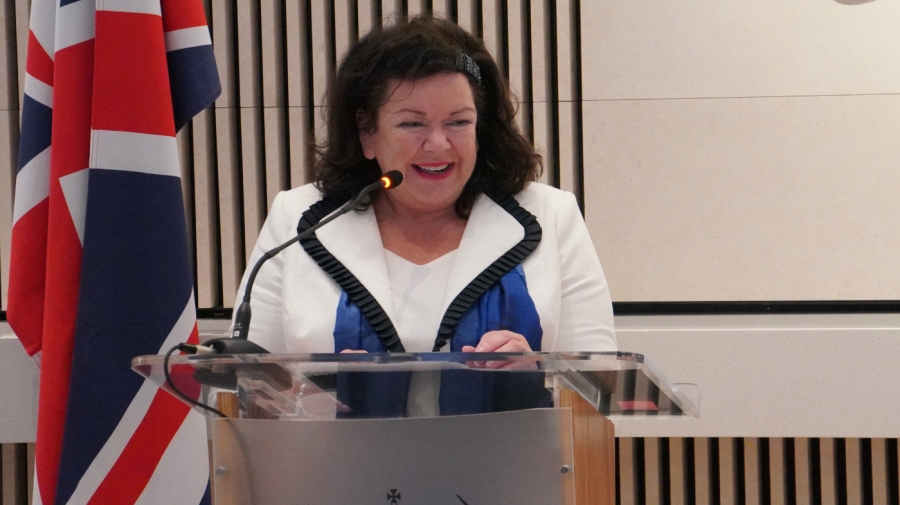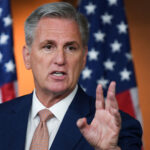
Dame Karen Pierce, the British ambassador to Washington, says the United Kingdom is not holding its breath for a free trade agreement with the U.S. in the wake of Brexit, a rare thorn in the “special” relationship.
While the Biden administration has eased U.S. tariffs on steel and aluminum that were imposed by the Trump administration, further negotiations for a greater free flow of goods between the two countries is unlikely to materialize, Pierce said in a recent interview with The Hill.
“The British government has said that they understand President Biden’s desire to focus on domestic issues, so we have not got a timetable for pushing negotiations on a free trade agreement,” she said.
“Instead what we are doing is looking sector by sector at how we might manage to get more trade and investment in both directions, so small- and medium-sized enterprises and digital. … We look very closely at what could be done absent a major free trade agreement to improve movements in both directions.”
One area where Pierce said concrete progress is making headway is AUKUS, the agreement among Australia, the United Kingdom and the U.S. to supply Canberra with nuclear-powered submarines.
The grouping was announced in September 2021 and led to a diplomatic crisis with France, whose estimated $40 billion contract to supply the submarines was tanked with no notice to Paris.
Pierce said that while the partners are not yet ready to brief the public on the progress being made on AUKUS, a ministerial meeting is expected to take place soon to announce what’s been achieved so far.
“It’s not just about the submarines, it’s about collaboration on next generation weapons and then it’s got a larger political, security policy, economic dimension about regional stability, where we work with a whole range of other countries to try and help the Indo-Pacific region with prosperity and stability,” she said.
The U.S. and U.K. focus on the Indo-Pacific largely refers to more than a dozen countries that find themselves on the front lines of China’s ambitions in the region and North Korea’s nuclear posturing.
They include close allies like South Korea, Japan, New Zealand and Australia, but also countries that are either more vulnerable to China’s influence, like Indonesia, or territories that face the greatest risk from Beijing aggression, such as Taiwan.
Pierce said that the U.S. and U.K. “share perspectives and we share proposals” on each country’s relations with China, and “we look for points of alignment — of which there are many — and where we disagree, it’s a good opportunity to talk about why we disagree and can we better align on certain aspects.”
In September 2021, the House of Lords International Relations and Defence Committee published a report chastising the British government for not having a coherent strategy on dealing with the security risks posed by China even as the U.K. sought deeper economic and trade ties.
In July, MI5 Director General Ken McCallum and FBI Director Chris Wray spoke together at Thames House, the headquarters for Britain’s internal security services, warning of the all-encompassing threats posed by the Chinese Communist Party.
Pierce, speaking with The Hill, said that the U.S. and U.K. have “a constant and ongoing free flow of information and policy ideas” about the approach to China “and sometimes common policy formulation, in each direction all the time, every day, every week.”
The free flow of information is consistent, she stressed, across changes in American presidential administrations and political shifts in Britain.
“I think it’s fair to say no single issue disrupts the relationship as a whole,” she said, and pointed to cooperation on NATO, supporting Ukraine, dealing with the rise of China and working “to preserve a rules-based system, in the face of Russia and China, fundamentally trying to assert a competition to set the rules of international affairs.”
“We can have some quite fierce arguments about individual policies,” she continued, “but fundamentally the bedrock is always there and the direction of travel is always the same, and it’s always up, even if individual issues cause a bit of a blip.”
READ MORE: The Hill sat down for with Ambassador Piece for an extensive interview at the British Embassy earlier this month. Find it on TheHill.com Tuesday morning.
For the latest news, weather, sports, and streaming video, head to The Hill.




